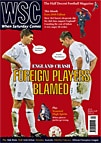 Rioting marred a dramatic final of Africa's Champions League, a competition that struggles in comparison to its European namesake and shares some of its drawbacks. Chris Taylor reports
Rioting marred a dramatic final of Africa's Champions League, a competition that struggles in comparison to its European namesake and shares some of its drawbacks. Chris Taylor reports
It was not perhaps the showpiece culmination to the year that the Confederation of African Football (CAF) had hoped for. The Cairo Stadium was full to bursting, with Egypt’s President Hosni Mubarak on hand to present the Champions League trophy to the winning team in the presence of massed ranks of dignitaries, and the match itself was certainly exciting. But the occasion ended in mayhem as the victorious Etoile du Sahel players were pelted with missiles and attacked by a mutinous crowd. And by the dignitaries. And the gentlemen of the press. At least no one could accuse them of not taking the competition seriously enough.
Few gave Tunisia’s Etoile much chance of victory after they drew the first leg of the final against Al-Ahly 0-0 at home in Sousse. Al-Ahly – along with Zamalek, one of Egypt’s two biggest clubs – have enjoyed a glittering period of success under their Portuguese coach, Manuel José. Over three years they had lifted an impressive 12 trophies. Now they had the chance to be crowned African champions for the third season running. Their victims in the final two years earlier had been Etoile.
Come the second leg, Al-Ahly, roared on by a fiercely partisan crowd, hit the woodwork twice but things started to go wrong for the hosts when the Etoile striker Afouène Gharbi scored in first-half injury time. Emad el-Nahas equalised in the 49th minute with a header but was sent off 11 minutes later for a professional foul. Seeing their title slipping away on the away-goals rule, ten-man Al-Ahly pressed forward in search of a goal and had two penalty appeals turned down. But three minutes into injury time the teenage striker Amine Chermiti added a second for Etoile and there was still time before the final whistle for Moussa Narry to rub it in with a third. Cue the violence, as the crowd attacked the winners and their own team with anything to hand.
For the Etoile players, victory was all that mattered. “My happiness cannot be described,” Gharbi said. “We have proved all the speculation wrong. All those who said Al-Ahly had a 70 per cent chance of winning were wrong.” José, who was physically attacked by his own team’s fans after the final whistle, railed against the refereeing in both legs. “In such a decisive game one mistake could make a difference,” he said, “but when the referees rule out three penalties for you, I think it is a disgrace.” CAF disagreed, praising the officials.
The 2007 edition of the Champions League, Africa’s top club competition, had an initial entry of 60 clubs, from the Seychelles’ Anse Réunion in the east to Gambia Port Authority in the west and from Mamelodi Sundowns in South Africa to Algeria’s Jeunesse Kabylie. But by the time it got down to the last-eight group stage, only Ivory Coast’s ASEC Mimosas prevented a clean sweep by north African teams, reflecting their leagues’ superior organisation and financial power.
The format, adopted in 1997, mimics its European equivalent (it began in 1964 as the Champions Cup). The official name is now the MTN Champions League thanks to a sponsorship tie-in with the continent’s biggest mobile-phone company. The deal is big for Africa but small by European standards: MTN is giving CAF $12.5 million (£6m) over four years.
In October CAF signed a long-term media deal with the SportFive rights agency, including $5m a year to screen the Champions League. The problem is not so much the modest price for the rights but the fact that Africans can just as easily watch the UEFA Champions League, the major European leagues and even South American football, which are not only of a higher standard but also feature Africa’s top players.
To some extent the competition has raised the profile of domestic African leagues but, like the European version, it has also had the effect of making the rich richer, with the big north African clubs able to import talent. Africa’s most populous country, Nigeria, has one of the stronger leagues, with many clubs financially supported by state governments or large companies, but it also faces difficulties common to other countries.
Tunde Oyedele, a former international player, told Nigeria’s The News recently that the league had “improved tremendously” but listed some persistent “shortcomings”. “The stands are still empty during league matches, the referees are also not helping matters because of their biased officiating. Violence is also prevalent at match venues. So, we still have a long way to go.” He might have mentioned politics: Nigerian football has been paralysed this season by a power struggle between the league (NFL) and the football association (NFA), ostensibly over who should appoint referees.
Although north African teams have dominated the competition in recent years, west African teams won in 1998 (ASEC, Ivory Coast), 2000 (Hearts of Oak, Ghana), 2003 and 2004 (both Enyimba, Nigeria). The big underachievers are South African teams, who have yet to win since first entering in 1993. In an effort to “raise the level and give more importance to national championships”, according to CAF’s president, Issa Hayatou, next year will see the launch of a biennial African Nations Championship solely for players playing their club football in Africa. Etoile have their own chance to raise African football’s profile when, as a result of their win in Cairo, they take part in the Club World Championship in Japan. Their chances of beating last year’s third place for Al-Ahly, though, must be some way short of 70 per cent.
From WSC 251 January 2008